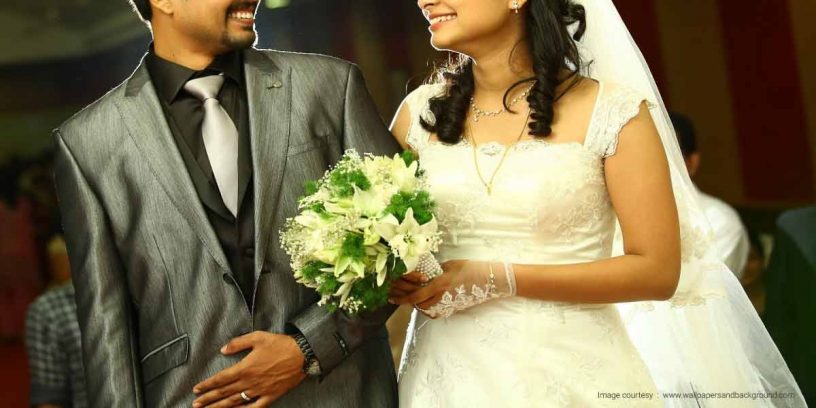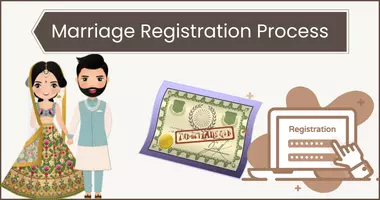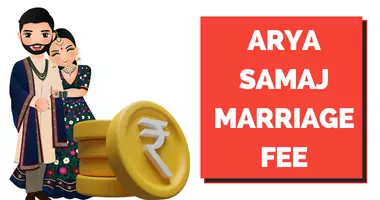Indian Christian Marriage Act, 1872 is the law that governs how Christian marriages are solemnized and registered. Christian marriage certificate is official legal proof that marriage has taken place under the Act. So, in India every Christian marriage must be registered. Even if one partner is Christian, the marriage must follow rules of this Act. In this blog we will discuss process and documents required under Indian Christian Marriage Act 1872.
Christian Marriage Registration
Christian marriages in India are governed by Christian Marriage Act, 1872.
- Marriage must be solemnized in church by priest or minister.
- After ceremony, priest issues marriage certificate to couple under Christian Marriage Act.
- Once marriage takes place, priest or church father will issue marriage certificate to newlyweds.
But before that, it’s important that both bride and groom must meet requirements of Christian Act before marriage is approved.
Note – Supreme Court of India has stated that all marriages, regardless of religion must be registered. This make sures legal recognition of marriage and protection of rights of both spouses. Many states now make marriage registration compulsory under law.
Requirements for Christian Marriage Registration
Marriage is recognized under Indian Christian Marriage Act only if one or both partners are Christians. If one of the people getting married is not allowed to marry other person by their own personal law, marriage is not valid under Christian Marriage Act. Marriage is considered valid under Indian Christian Marriage Act, 1872, only when following conditions are fulfilled:
- Bridegroom must be at least 21 years old and bride must be at least 18 years old
- Consent of both partners should be given voluntary, without deception, compulsion or under any influence
- Neither party should have living spouse at time of marriage
- Priest or minister in church must perform marriage, with at least two witnesses present
Who is authorized to solemnize Christian marriage
Under Section 5 of the Act, following persons are eligible to perform christian marriage registration under Christian Marriage Act 1872:
- Local priests or pastors authorized by their church to perform weddings.
- Religious leaders who have been officially licensed by State Government..
- Licensed ministers – Minister of Religion licensed under this Act to solemnize marriages;
- Marriage registrar – Govt. official (or someone they appoint) who can perform ceremony in civil setting.
- Special license holders – People specially authorized under the Act to marry Indian Christians, in areas without church or registrar..
If someone who is not authorized to marry people performs a marriage, the marriage is not valid.
Conditions Required for Performance of a Marriage by a Marriage Registrar
Marriage registrars under Indian Christian Marriage Act, 1872, must follow these guidelines when solemnizing marriages:
(a) Notice of Intended Marriage to the Registrar:
If one of the parties lives in same area as Marriage Registrar, that person must submit written application or notice to inform Registrar of their intention to marry.
When bride and groom live in different areas, each person must submit separate written notice to Registrar in their own area of residence.
Once the notice is received, Registrar records it in the Marriage Register and displays it to visible spot in the office.
(b) Making Pledge before the Registrar:
To get certificate of notice, one of the parties must appear before Marriage Registrar and declare that
- there is no obstacle, natural predisposition or other legitimate obstruction to the marriage;
- the place of residence of both the parties is within the locale of the marriage registrar;
If one of the party is minor, consent must be given by:
- Father of minor, if alive
- Legal guardian (if no father), or
- Mother (if no guardian and no other authorized person is living in India)
(c) Issuing of Certificate of Notice after Pledge
After one party makes the pledge before Registrar and four days have passed since notice of intended marriage was filed, Registrar can issue Certificate of Notice.
Certificate of notice specifies where marriage ceremony will take place ( in church or chapel).
Registrar will not issue certificate if someone objects and gives reasons why it should not be issued. Once Registrar issues Certificate of Notice, it becomes mandatory to perform marriage within two months from the date of issuance.
If marriage does not happen within the time limit, certificate expires and you need to get new one.
Performance of the Marriage under the Act
When Christian marriage is registered under the Act, marriage ceremony must follow religious customs or practices of minister or priest. Christian Marriage Act prescribes these rituals as part of the marriage process.
legal marriage needs:
- Priest or minister
- Two adult witnesses who watch and sign register
It’s important to note that, according to Christian Marriage Act, if marriage has not been solemnized within two months after issuance of the certificate of notice. If marriage does not take place within this period then, you have to apply for fresh certificate of notice in order to proceed with marriage
Time and place for performance of marriage
The Act sets rules for when and where Christian marriage registration can take place. Christian marriages must be performed between 6 a.m. and 7 p.m. in church.
Church leaders can perform marriages outside of church and at other times of day, but only if they have special permission.
Christian marriage registration
To get married under the Christian Marriage Act, the couple must fill out an application and give it to the registrar in their area. The registrar will register marriage in presence of the couple.
Couple and their witnesses must sign acknowledgement slip. Then, slip is sent to registrar who keeps track of births, deaths and marriages in that district.
Indian Christian couples also have option to marry under Special Marriage Act, 1954. This Act requires only one month’s notice before wedding. Marriage is both solemnized and registered by Marriage Officer or Registrar. It applies to couples of any religion Hindu, Christian, Jewish, Muslim and so on.
Documents Required for Registering the Marriage under the Christian Marriage Act
You need to submit following documents for Indian christian marriage registration:
- Complete application form;
- 3 Passport Size photographs,
- Marriage Certificate issued by Minister or Priest who performed wedding,
- Two photographs of wedding rituals along with wedding invite;
- Residence and age proof of either party to marriage (Voter Card/Aadhaar Card/PAN Card of both Bride and Groom);
- Document (affidavit) certifying mental and marital status of both parties.
Procedure for Christian Marriage Registration
Here is the step guide for Christian Marriage Registration under Christian Marriage Act
Step 1: Married couple must visit office of M. T. Kom, Additional District Magistrate (West), Old Middle School Building, Lawrence Road, Rampura, Delhi – 110035 (nearest Metro Station: Keshav Puram). Couple must carry two Christian marriage certificates issued by Vicar along with following documents mentioned below.
Step 2: After submitting original and copy documents to ADM, office will ask you to prepare affidavit on Rs. 10/- stamp paper (matter will be given by office). ADM will verify all submitted documents and return them. After verification, ADM will fix hearing date and ask you to purchase form by paying Rs. 200/- and bring filled form on hearing date.
Step 3: On hearing date, married couple (with all required documents and two witnesses) must be present. Witnesses must carry documents.
Step 4: Final verification will be done by ADM under Christian Marriage Act and also issuance of Marriage Certificate.
FAQs
How do you register marriage under the Christian Marriage Act?
To register Christian marriage under Act, couple must apply to local Marriage Registrar with required documents and church certificates. After verification and hearing with two witnesses, Registrar issues official Marriage Certificate.
What is the Christian Act of marriage?
Indian Christian Marriage Act, 1872 is law for Christian marriages in India. It explains how wedding ceremony should be done, who can conduct it, and how marriage is registered with the government. After registration, couple gets valid marriage certificate.
What is Section 32 of the Christian marriage Act?
Section 32 of this Act is about objections to a marriage. If someone has valid reason to stop a marriage after it’s been announced, this section deals with that process.
What is Section 37 of the Christian marriage Act?
Section 37 of this Act is about sending marriage certificates to government officials. It’s rule about how records of Christian marriages are officially shared.
Is Hindu Marriage Act applicable to Christians?
No, Hindu Marriage Act does not apply to Christians. Christians in India get married under Indian Christian Marriage Act, 1872, or Special Marriage Act, 1954.
What are the requirements for marriage in Christianity?
Under Christian Marriage Act, groom must be 21 or above and bride must be 18 or above. Both must agree to marry, must not already be married, and marriage must be done by priest or Marriage Registrar in front of two witnesses.





Nainan Joy
I am a widower 55 y and my fiancee is a widow 44y.
We are both regular church goers. But she wants to keep her marriage a lit
We intend to have a sacred holy marriage followed by government registration.
Our immediate family members have already given their concent . We live in Ranchi, Jharkhand.
Kindly advise.
Nainan Joy
I am from Kerala a teacher by profession and a member of Church of North India.
My fiancee is a tribel from Jharkhand and a stanch catholic.
After marriage I wish to join the tribel community as I already live with them.
We both are from Ranchi.
Azad nabi
Jion Christian